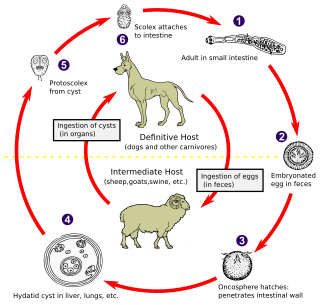
Echinococcosis is a parasitic disease of tapeworms of the Echinococcus type. The two main types of the disease are cystic echinococcosis and alveolar echinococcosis. Less common forms include polycystic echinococcosis and unicystic echinococcosis.

Colubridae is a family of snakes. With 249 genera, it is the largest snake family. The earliest species of the family date back to the Oligocene epoch. Colubrid snakes are found on every continent except Antarctica.

Squamata is the largest order of reptiles, comprising lizards, snakes, and amphisbaenians, which are collectively known as squamates or scaled reptiles. With over 10,900 species, it is also the second-largest order of extant (living) vertebrates, after the perciform fish. Members of the order are distinguished by their skins, which bear horny scales or shields, and must periodically engage in molting. They also possess movable quadrate bones, making possible movement of the upper jaw relative to the neurocranium. This is particularly visible in snakes, which are able to open their mouths very wide to accommodate comparatively large prey. Squamates are the most variably sized living reptiles, ranging from the 16 mm (0.63 in) dwarf gecko to the 6.5 m (21 ft) Reticulated python. The now-extinct mosasaurs reached lengths over 14 m (46 ft).

Trimeresurus is a genus of venomous pit vipers found in Asia from the Indian Subcontinent throughout Southeast Asia, China, and the Pacific Islands. Currently 44 species are recognized. Common names include Asian palm pit vipers, Asian lanceheads, and green pit vipers.

Echinococcus is a genus within Cestoda, a parasitic class of the platyhelminthes phylum. Human echinococcosis is an infectious disease caused by the following species: E. granulosus, E. multilocularis, or E. vogeli.

Toxicofera is a proposed clade of scaled reptiles (squamates) that includes the Serpentes (snakes), Anguimorpha and Iguania. Toxicofera contains about 4,600 species, of extant Squamata. It encompasses all venomous reptile species, as well as numerous related non-venomous species. There is little morphological evidence to support this grouping, however it has been recovered by all molecular analyses as of 2012.

Dendrelaphis is a genus of colubrid snakes, distributed from Pakistan, India and southern China to Indonesia, Timor-Leste, the Philippines, Australia, New Guinea and the Solomon Islands. There are over forty described species. Asian species are known commonly as bronzebacks, while the Australo-Papuan species are simply called treesnakes. All are non-venomous and entirely harmless to humans.

The big-headed turtle is a species of turtle in the family Platysternidae from Southeast Asia and southern China.
Michael Wilmer Forbes Tweedie was a naturalist and archaeologist working in South East Asia, who was Director of the Raffles Museum in Singapore.

The Calamariinae are a subfamily of colubrid snakes, commonly known as reed snakes, that are found in southern and southeastern Asia. They are most diverse in Indonesia, especially Sumatra and Borneo. The subfamily contains 90 species in seven genera. Very few specimens of most species have been collected.

Trimeresurus vogeli, commonly known as the Vogel's pit viper, is a venomous pitviper species native to Southeast Asia.
Macrocalamus is a genus of snakes of the family Colubridae.
Macrocalamus lateralis, the side-blotched reed snake, Malayan mountain reed snake, or striped reed snake, is a species of snake in the family Colubridae. The species is endemic to southern Thailand and Peninsular Malaysia.

Echinococcus vogeli is a small cyclophyllid tapeworm found in Central and South America. E. vogeli, as well as other members of the genus Echinococcus, produce a disease called echinococcosis. Echinococcosis, also known has hydatidosis, is a result of ingesting the eggs of the genus Echinococcus. E. vogeli is similar to E. multilocularis in that both species produces many small cysts that spread throughout the internal organs of the infected animal. The ingestion of E. vogeli eggs, and the spreading of the cysts through infected host, will results in Polycystic Echinococcosis.
Macrocalamus chanardi, Chanard’s reed snake, is a species of snake in the family Colubridae. The species is endemic to Malaysia.
Macrocalamus emas, the golden-bellied reed snake, is a species of snake in the family Colubridae. The species is endemic to Malaysia.
Macrocalamus gentingensis, the Genting Highlands reed snake, is a species of snake in the family Colubridae. The species is endemic to Malaysia.
Macrocalamus jasoni, Jason's reed snake, is a species of snake in the family Colubridae. The species is endemic to Malaysia.
Macrocalamus schulzi, Schulz's reed snake, is a species of snake in the family Colubridae. The species is endemic to Malaysia.
Macrocalamus tweediei, Tweedie's reed snake or Tweedie's mountain reed snake, is a species of snake in the family Colubridae. The species is endemic to Malaysia.











